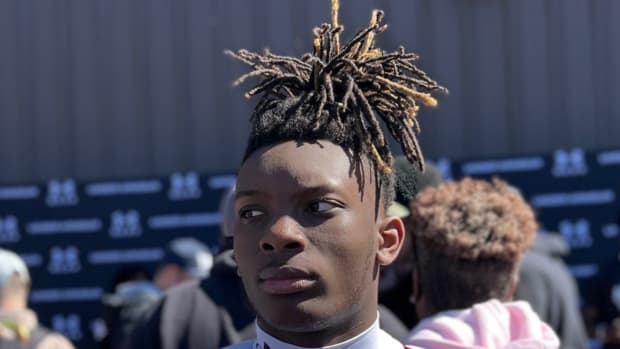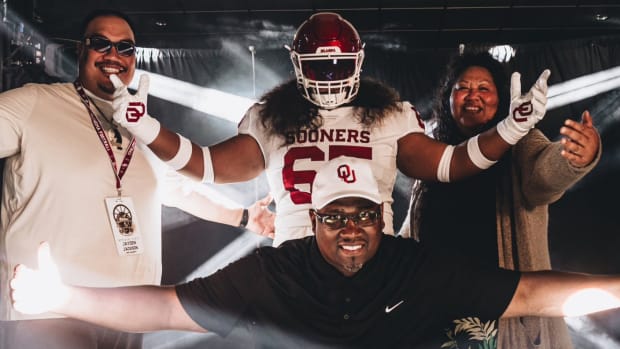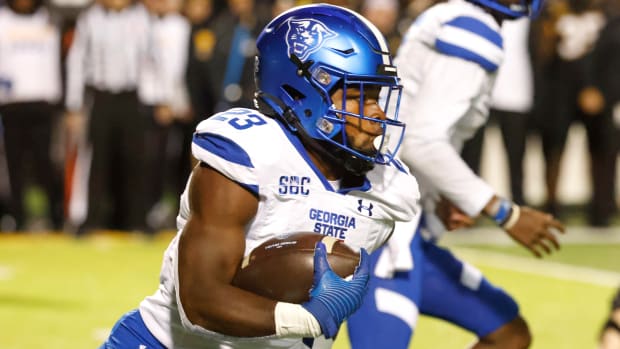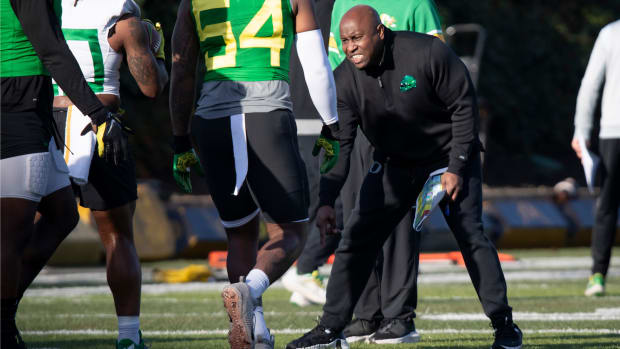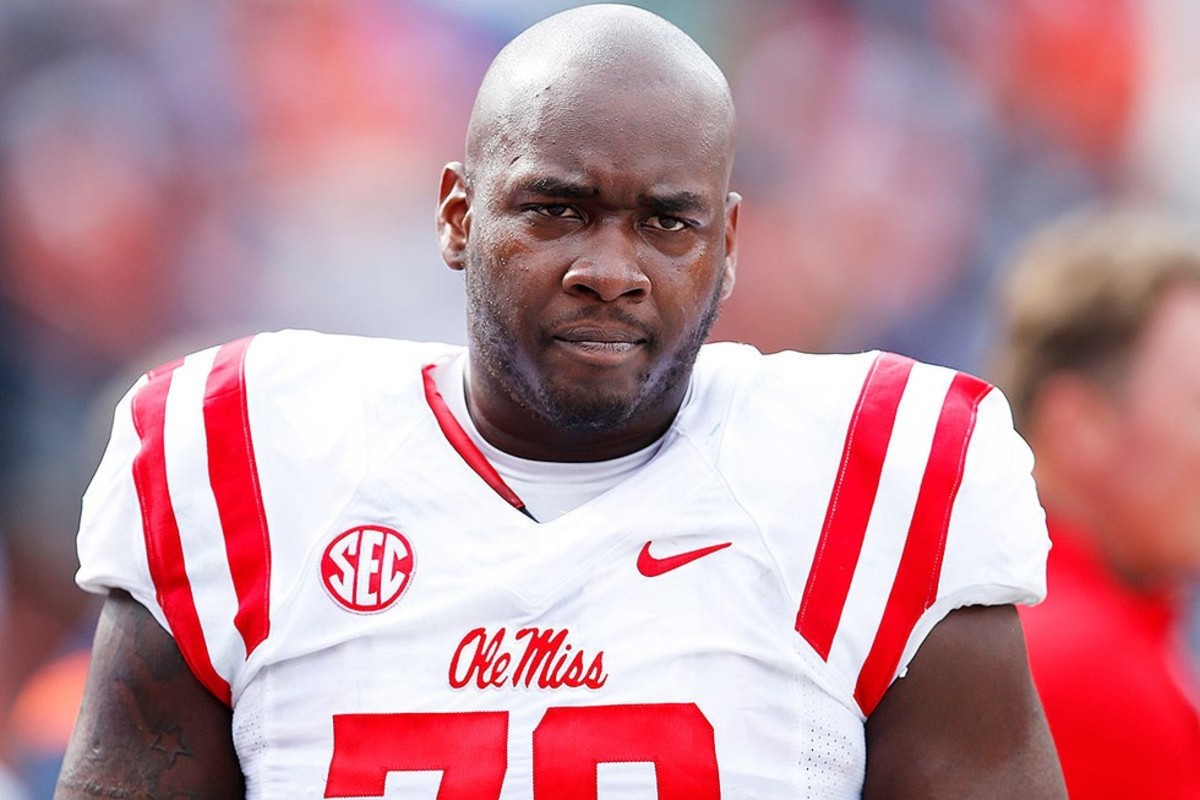
Laremy Tunsil's draft-night admission not death sentence for Ole Miss, but future looks murky
[video: 13724914]
It all sounded pretty damning from an NCAA standpoint. Former Ole Miss offensive tackle Laremy Tunsil appeared to admit Thursday night to taking money from Ole Miss staffers. After someone tried to destroy Tunsil, after he lost more in guaranteed money than most of us will make in a lifetime, Tunsil may have slipped and said something he shouldn't have.
Tunsil is entering a world in which it is O.K. for people to give him money for being good at football. He is leaving a world in which the compensation level is capped by the NCAA. And while many of us don't see anything wrong with breaking that wage ceiling to reward people the market considers valuable, the people in charge of the schools that make up the NCAA frown upon this practice with regard to football. So, Ole Miss, by virtue of its membership in the NCAA, has agreed to accept any consequences if those rules were broken. Those people Tunsil just left in Oxford will still have to deal with the fallout.
But in the case of the leaked screenshots of alleged text message conversations between Tunsil and assistant athletic director John Miller, the school might have a way out even though it appeared Thursday that it had been caught dead to rights violating the NCAA's golden rule. (If you have a bunch of gold, make sure it's only going to your coaches, AD and the occasional training room waterfall.) This only works for the Rebels if they documented everything properly last year, and it does not help the pending NCAA case for which Ole Miss has received—but not released—a Notice of Allegations. That case involves multiple sports, including football, track and women's basketball. Some football allegations date back to Houston Nutt's time as coach. That ended in 2011. It was believed the only allegations involving Hugh Freeze's administration involved Tunsil, whom the NCAA suspended for seven games last season after discovering he had received three loaner vehicles, an interest-free promissory note on a down payment for a car and a plane ticket.
NIESEN: What Tunsil's admission means in current college sports landscape
Thursday's revelation—posted to Tunsil's Instagram account after he was drafted by the Miami Dolphins—could be something the NCAA hasn't seen. The text messages could have been faked, though they should be easily verifiable if the texts were sent to an Ole Miss-owned device used by Miller. They could also be something the school could explain provided Rebels staffers handled the situation in a very specific way.
Here are the alleged texts. "Barney" presumably refers to Ole Miss assistant AD Barney Farrar:
Tunsil was asked about the screen grabs in a press conference Thursday. At first, he said they were faked. Then, when a reporter asked a follow-up question, Tunsil reversed course. "Oh, the messages? Oh, those are true," Tunsil said. "Like I said, I made a mistake. That happened."
This brought another follow-up. "So was it an exchange of you and your coach of money?" a reporter asked.
"I'd have to say, yeah," Tunsil replied.
Shortly afterward, a woman whisked Tunsil off the dais—cutting off his answer to a question.
Miller's alleged responses to Tunsil's alleged request for rent money in February 2015 may look suspicious, but they don't actually prove anything. Miller's responses to Tunsil's alleged April 2015 request for money to help his mother pay her electric bill, however, seem to violate Rule No. 2 of Cheating For Dummies (Nothing In Writing). The alleged texts appear to describe a preexisting payment arrangement. Under virtually any circumstances, the verification of those texts would put Ole Miss on the hook for a violation involving extra benefits handed out by a high-level staffer. That's the sort of thing that gets rival fans and officials from the NCAA's enforcement branch salivating*.
*The happiest school in all of this is Alabama. Crimson Tide defensive line coach Bo Davis resigned Friday. The Tuscaloosa News reported Thursday that Davis would lose his job over alleged recruiting violations. Normally, the assistant who coaches the best position group for the defending national champion resigning in late April would be a huge story. The Tunsil drama reduced it to a footnote.
Stacy Revere/Getty Images
No one from Ole Miss is talking beyond a generic statement released early Friday morning. Athletic director Ross Bjork has not responded to text messages from SI.com. But if Ole Miss officials were thinking ahead, they could have used a federal court ruling from the previous year to justify giving Tunsil money above tuition, room and board. On Aug. 8, 2014, Judge Claudia Wilken ruled against the NCAA in a case brought by former UCLA basketball player Ed O'Bannon. One of the stipulations in Wilken's ruling was that schools were no longer allowed to make rules that capped scholarships below the actual cost-of-attendance figure the schools reported to the federal government. This meant that schools could offer the difference between tuition, room and board and the actual cost of attendance as a cash stipend. In the case of Ole Miss, that amount is $4,500. But here's the catch. Schools didn't start offering those stipends until the 2015–16 school year. Yet because they had to comply with the federal court ruling, they could provide up to that amount for an athlete using the NCAA's Student Assistance Fund. This is a pool of cash—which also has its roots in a federal lawsuit—available to schools to use when players face a sudden need. The usual example here is the cost of traveling home to a family member's funeral. Recently, schools have also used this fund to purchase disability and/or loss-of-value insurance policies for their best football and basketball players.
In the 2014–15 academic year, when those texts were allegedly sent, a school could have used money from the SAF to pay a player up to the difference between his scholarship and the actual cost of attendance. In that case, Ole Miss could have given Tunsil up to $4,500. This window closed when the Rebels began to offer cost-of-attendance stipends, but it was open during the dates in question, according to people with knowledge of the NCAA's compliance interpretations at the time.
This explanation would only be accepted if Ole Miss documented all payments to Tunsil as such when they happened. SEC schools are required to log all their SAF disbursements with the conference office. If there's a record of those payments to Tunsil, voila. The Rebels were simply complying with the court's ruling. This wouldn't satisfy rival fans and coaches who thirst for NCAA-related blood to be spilled in Oxford, but it would keep the wolves at bay in this particular instance.
If, however, there is no record of payments being made through the SAF and the texts are verified as real, that becomes a much bigger problem for Ole Miss. Then the Rebels would face the kind of NCAA scrutiny their rivals have predicted since they landed the prized 2013 recruiting class that included '16 first-round picks Tunsil, Robert Nkemdiche and Laquon Treadwell.
KAPLAN: Behind the scenes of Laremy Tunsil's NFL draft nightmare
No matter what, recruiting will be more difficult going forward. The Rebels signed an excellent class in February in spite of an NCAA investigation that dragged through three recruiting cycles. Offensive tackle Greg Little from Allen, Texas, appears capable of stepping in and starting at left tackle just as Tunsil did as a true freshman. Quarterback Shea Patterson seems to be a terrific replacement for senior Chad Kelly.
But recruits considering Ole Miss will now be treated at every turn to video of Tunsil's apparent admission. (This admission isn't as useful as you might think in an NCAA enforcement context. Tunsil would have to say the same thing to an NCAA investigator, and he is under no obligation to speak to them.) Rival schools will claim the NCAA hammer is coming in an attempt to keep the best players out of Oxford. And the NCAA's enforcement department, sniffing more smoke, will want to question every player interested in Ole Miss. The experience could be so unpleasant that it may not be worth the trouble.
Tunsil's words on Thursday probably won't get Freeze fired. They won't cause the program to immediately crumble. But unless the Rebels have that specific explanation and the documentation to back it up, the future looks considerably muddier.

